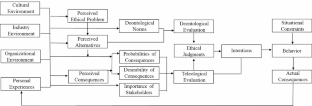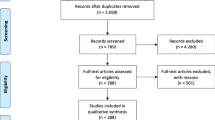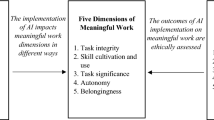Abstract
Artificial Intelligence (AI) ethics is needed to address the risks that are outpacing efforts to protect consumers and society. AI is becoming human-competitive with the ability to perform tasks, that without controls, can result in harmful or destructive actions. Principles are currently the most discussed ethical approach for pervasive boundaries for algorithmic rule-based intelligence. Principles, values, norms, and rules should be the foundation of an ethical corporate culture with all participants aware of and involved in develo** AI ethics. To address these concerns, a theory-based decision framework is presented to incorporate ethical considerations into AI applications. With limited discussion on frameworks to manage AI ethics, we provide a modification of the Hunt–Vitell (H–V) ethical decision model to provide a supportive theoretical framework. This model considers the cultural, industry, organizational, and legal standards that shape AI ethical decision making. The model is based on individual decision making and parallels the decision process in autonomous AI system decision making. Topics for additional research are advanced to create expanded knowledge on this topic.


Similar content being viewed by others
References
Access, N. (2018, November). Human rights in the age of artificial intelligence. https://www.accessnow.org/cms/assets/uploads/2018/11/AI-and-Human-Rights.pdf.
Ajzen, I., & Fishbein, M. (2005). The influence of attitudes on behavior. In D. Albarracín, B. T. Johnson, & M. P. Zanna (Eds.), The handbook of attitudes (pp. 173–221.), Erlbaum.
Ansari, M. P., & Singh, D. K. (2023). Identifying human activities in megastores through postural data to monitor shoplifting events. Neural Computing and Applications, 35, 6515–6528.
Bei**g, A. I. P. (2019, May 25). Bei**g Academy of Artificial Intelligence. JournalismAI. https://journalismai.com/2019/05/25/bei**g-ai-principles-bei**g-academy-of-artificial-intelligence-2019.
Bock, D. E., Wolter, J., & Ferrell, O. C. (2020). Artificial intelligence: Disrupting what we know about services. Journal of Services Marketing, 34(3), 317–334.
Boose, M., & Dean, F. (2000). Analyzing ethical decision-making: Applying the Hunt-Vitell model in insurance courses. Risk and Management Insurance Review, 3(2), 237–249. https://doi.org/10.1111/j.1540-6296.2000.tb00032.x.
Bubeck, S., Chandrasekaran, V., Eldan, R., Gehrke, J., Horvitz, E., Kamar, E., Lee, P., Lee, Y. T., Li, Y., Lundberg, S., Nori, H., Palangi, H., Ribeiro, M. T., & Zhang, Y. (2023). Sparks of artificial general intelligence: Early experiments with GPT-4. ar**v preprint ar**v:2303.12712.
Buhmann, A., Paßmann, J., & Fieseler, C. (2019). Managing algorithmic accountability: Balancing reputational concerns, engagement strategies, and the potential of rational discourse. Journal of Business Ethics, 163, 265–280.
Burström, T., Parida, V., Lahti, T., & Wincent, J. (2021). AI-enabled business-model innovation and transformation in industrial ecosystems: A framework, model and outline for further research. Journal of Business Research, 127, 85–95.
Casali, G. L., & Perano, M. (2021). Forty years of research on factors influencing ethical decision making: Establishing a future research agenda. Journal of Business Research, 132, 614–630.
Cerullo, M. (2023, March 22). Cybercriminals are using AI voice cloning tools to dupe victims. CBS News. https://www.cbsnews.com/philadelphia/news/ai-scam-voice-cloning-rising-ftc/.
Chen, A. (2018). July 26). IBM’s Watson gave unsafe recommendations for treating cancer. The Verge. https://www.theverge.com/2018/7/26/17619382/ibms-watson-cancer-ai-healthcare-science.
Cui, Y. G., van Esch, P., & Jain, S. P. (2021). Just walk out: The effect of AI-enabled checkouts. European Journal of Marketing.
Davenport, T. (2019, March 2). What we talk about when we talk about AI. https://www.tomdavenport.com/what-we-talk-about-when-we-talk-about-ai.
Davenport, T. H., & Kirby, J. (2016). Just how smart are smart machines? MIT Sloan Management Review, 57(3), 21.
Davenport, T. H., & Ronanki, R. (2018). Artificial intelligence for the real world. Harvard Business Review, 96(1), 108–116.
Davenport, T., Guha, A., Grewal, D., & Bressgott, T. (2020). How artificial intelligence will change the future of marketing. Journal of the Academy of Marketing Science, 48(1), 24–42.
de Vries, T., Misra, I., Wang, C., & van der Maaten, L. (2019). Does object recognition work for everyone? Proceedings of the IEEE/CVF Conference on Computer Vision and Pattern Recognition Workshops, 52, 59.
Deloitte (2023). Ethical technology: Everyone’s responsibility. https://www2.deloitte.com/us/en/pages/about-deloitte/articles/technology-trust-ethics-annual-report.html.
Dholakia, N., & Firat, A. F. (2019). Markets, consumers and society in the age of heteromation. European Journal of Marketing, 53(8), 1504–1520.
Du, S., & **e, C. (2021). Paradoxes of artificial intelligence in consumer markets: Ethical challenges and opportunities. Journal of Business Research, 129, 961–974.
Etzioni, A., & Etzioni, O. (2016). AI assisted ethics. Ethics Information Technology, 18, 149–156.
Ferrell, O. C., & Ferrell, L. (2021). Applying the Hunt Vitell ethics model to artificial intelligence ethics. Journal of Global Scholars of Marketing Science, 31(2), 178–188.
Ferrell, O. C., Fraedrich, J., & Ferrell, L. (2022). Business ethics: Ethical decision making and cases. Cengage.
Fjeld, J., Achten, N., Hilligoss, H., Nagy, A., & Srikumar, M. (2020). Principled artificial intelligence: Map** consensus in ethical and rights-based approaches to principles for AI. Berkman Klein Center Research Publication, (2020-1), https://doi.org/10.2139/ssrn.3518482.
Ghallab, M. (2019). Responsible A.I.: Requirements and challenges. AI Perspectives, 1(1), 1–7.
Grant, N., & Weise, K. (2023, April 7). In A.I. race, Microsoft and Google choose speed over caution: Technology companies were once leery of what some artificial intelligence could do. Now the priority is winning control of the industry’s next big thing. The New York Times. https://www.nytimes.com/2023/04/07/technology/ai-chatbots-google-microsoft.html.
Greene, D., Hoffmann, A. L., & Stark, L. (2019). Better, nicer, clearer, fairer: A critical assessment of the movement for ethical artificial intelligence and machine learning. Proceedings of the 52nd Hawaii International Conference on System Sciences.
Hagendorff, T. (2020). The ethics of AI ethics: An evaluation of guidelines. Minds and Machines, 30, 99–120.
Hao, K. (2019, April 5). Facebook’s ad-serving algorithm discriminates by gender and race. Technology Review. https://www.technologyreview.com/2019/04/05/1175/facebook-algorithm-discriminates-ai-bias/.
Harrison, D., Ajjan, H., Ferrell, O., Hochstein, B., & Ferrell, L. (2023). The disconnect of AI principles and decision making: A path forward, working paper.
Hermann, E. (2021). Leveraging artificial intelligence in marketing for social good—An ethical perspective. Journal of Business Ethics, 179, 1–19.
Huang, M. H. (2017). Technology in the frontline: From dumb to thinking to feeling. Journal of Service Research, 20(1), 93–95.
Huang, M. H., & Rust, R. T. (2018). Artificial intelligence in service. Journal of Service Research, 21(2), 155–172.
Hunt, S. D., & Laverie, D. A. (2004). Experiential learning and the Hunt-Vitell theory of ethics: Teaching marketing ethics by integrating theory and practice. Marketing Education Review, 14(3), 1–14. https://doi.org/10.1080/10528008.2004.11488874.
Hunt, S. D., & Vitell, S. (1986). A general theory of marketing ethics. Journal of Macromarketing, 6(1), 5–16.
Hunt, S. D., & Vitell, S. M. (2005). The general theory of marketing ethics: A revision and three questions. Journal of Macromarketing, 26, 143–153.
Hustedt, C., & Fetic, L. (2020, April 2). From principles to practice: How can we make AI ethics measurable? Ethics of Algorithms. https://ethicsofalgorithms.org/2020/04/02/from-principles-to-practice-how-can-we-make-ai-ethics-measurable/.
IBM (2022). Everyday ethics for artificial intelligence. https://www.ibm.com/watson/assets/duo/pdf/everydayethics.pdf.
Jobin, A., Ienca, M., & Vayena, E. (2019). The global landscape of AI ethics guidelines. Nature Machine Intelligence, 1, 389–399. https://doi.org/10.1038/s42256-019-0088-2.
Kaplan, A., & Haenlein, M. (2019). Siri, Siri, in my hand: Who’s the fairest in the land? On the interpretations, illustrations, and implications of artificial intelligence. Business Horizons, 62(1), 15–25.
Kaplan, A., & Haenlein, M. (2020). Rulers of the world, unite! The challenges and opportunities of artificial intelligence. Business Horizons, 63(1), 37–50.
Kaplan, R. S., & Mikes, A. (2012). Managing risks: A new framework. Harvard Business Review, 90, 48–60.
Kelley, S. (2022). Employee perceptions of the effective adoption of AI principles. Journal of Business Ethics, 178, 871–893. https://doi.org/10.1007/s10551-022-05051-y.
Khan, L. (2023, May 3). FTC chair says agency is watching for ‘unfair or deceptive use of AI use.’ The Hill. https://thehill.com/policy/technology/3985771-ftc-chair-says-agency-watching-for-unfair-or-deceptive-ai-use/.
Koshiyama, A., Kazim, E., Treleaven, P., Rai, P., Szpruch, L., Pavey, G., Ahamat, G., Leutner, F., Goebe, R., Knight, A., Adams, J., Hitrova, C., Barnett, J., Nachev, P., Barber, D., Chamorro-Premuzic, T., Klemmer, K., Gregorovic, M., Khan, S., & Lomas, E. (2021). Towards algorithm auditing: A survey on managing legal, ethical and technological risks of AI, ML and associated algorithms. https://papers.ssrn.com/sol3/papers.cfm?abstract_id=3778998.
Krafft, T., Hauer, M., Fetic, L., Kaminski, A., Puntschuh, M., Otto, P., Hubig, C., Fleischer, T., Grünke, P., Hillerbrand, R., Hustedt, C., & Hallensleben, S. (2020). From principles to practice: An interdisciplinary framework to operationalise AI ethics. https://www.researchgate.net/publication/340378463_From_Principles_to_Practice_-_An_interdisciplinary_framework_to_operationalise_AI_ethics.
Laurance, B. (2019, September 16). AI: Ethics must be the starting point – OECD. London Business School. https://www.london.edu/think/iie-ai-significant-potential-but-ethics-must-be-the-starting-point-says-oecd.
Lee, L. W., Dabirian, A., McCarthy, I. P., & Kietzmann, J. (2020). Making sense of text: AI-enabled content analysis. European Journal of Marketing, 54(3), 615–644.
Leone, D., Schiavone, F., Appio, F. P., & Chiao, B. (2021). How does artificial intelligence enable and enhance value co-creation in industrial markets? An exploratory case study in the healthcare ecosystem. Journal of Business Research, 129, 849–859.
Li, M. (2020, October 26). To build less-biased AI, hire a more diverse team. Harvard Business Review. https://hbr.org/2020/10/to-build-less-biased-ai-hire-a-more-diverse-team.
Lobschat, L., Mueller, B., Eggers, F., Brandimarte, L., Diefenbach, S., Kroschke, M., & Wirtz, J. (2021). Corporate digital responsibility. Journal of Business Research, 122, 875–888.
Loureiro, S. M. C., Guerreiro, J., & Tussyadiah, I. (2020). Artificial intelligence in business: State of the art and future research agenda. Journal of Business Research, 129, 911–926.
Lurie, Y. (2004). Humanizing business through emotions: On the role of emotions in ethics. Journal of Business Ethics, 49, 1–11.
Makarius, E. E., Mukherjee, D., Fox, J. D., & Fox, A. K. (2020). Rising with the machines: A sociotechnical framework for bringing artificial intelligence into the organization. Journal of Business Research, 120, 262–273.
Manis, K. T., & Madhavaram, S. (2023). AI-Enabled marketing capabilities and the hierarchy of capabilities: Conceptualization, proposition development, and research avenues. Journal of Business Research, 157, 113485.
Markus, M. L. (2017). Datification, organizational strategy, and IS research: What’s the score? Journal of Strategic Information Systems, 26(3), 233–241.
Martin, K. (2018). Ethical implications and accountability of algorithms. Journal of Business Ethics, 160(4), 835–850.
Martin, K. E., & Freeman, R. E. (2004). The separation of technology and ethics in business ethics. Journal of Business Ethics, 53(4), 353–364.
Martin, K., Shilton, K., & Smith, J. (2019). Business and the ethical implications of technology: Introduction to the symposium. Journal of Business Ethics, 160(2), 307–317.
Mayo, M. A., & Marks, L. J. (1990). An empirical investigation of a general theory of marketing ethics. Journal of the Academy of Marketing Science, 18(2), 163–171.
McNamara, A., Smith, J., & Murphy-Hill, E. (2018). Does ACM’s code of ethics change ethical decision-making in software development? Proceedings of the 2018 26th ACM Joint Meeting on European Software Engineering Conference and Symposium on the Foundations of Software Engineering, 729–733.
Metz, C., & Schmidt, G. (2023, March 29). Elon Musk and others call for pause on A.I., citing ‘profound risks to society.’ The New York Times, https://www.nytimes.com/2023/03/29/technology/ai-artificial-intelligence-musk-risks.html.
Miller, A. P., & Hosanagar, K. (2019). November 8). How targeted ads and dynamic pricing can perpetuate bias. Harvard Business Review. https://hbr.org/2019/11/how-targeted-ads-and-dynamic-pricing-can-perpetuate-bias.
Morley, J., Floridi, L., Kinsey, L., & Elhalal, A. (2020). From what to how: An initial review of publicly available AI ethics tools, methods and research to translate principles into practices. Science and Engineering Ethics, 26(4), 2141–2168.
Morris, D. (2020, January 31). How marketers are increasingly using A.I. to persuade you to buy. Fortune. https://fortune.com/2020/01/31/ai-marketing-persuade/.
Morse, L., Teodorescu, M. H. M., Awwad, Y., & Kane, G. C. (2021). Do the ends justify the means? Variation in the distributive and procedural fairness of machine learning algorithms. Journal of Business Ethics, 181(4), 1–13.
Mustak, M., Salminen, J., Plé, L., & Wirtz, J. (2021). Artificial intelligence in marketing: Topic modeling, scientometric analysis, and research agenda. Journal of Business Research, 124, 389–404.
OpenAI (2023). GPT-4 technical report. https://cdn.openai.com/papers/gpt-4.pdf.
Perez-Vega, R., Kaartemo, V., Lages, C. R., Razavi, N. B., & Männistö, J. (2021). Resha** the contexts of online customer engagement behavior via artificial intelligence: A conceptual framework. Journal of Business Research, 129, 902–910.
Pichai, S. (2018, June 7). AI at Google: Our principles. Google Blog. https://www.blog.google/technology/ai/ai-principles/.
Prabbakaron, V., Qadri, R., & Hutchinson, B. (2022). Incongruencies in artificial intelligence. First Workshop on AI/AI in Culture. https://doi.org/10.48550/ar**v.2211.13069.
PwC Analysis (2017). Sizing the prize: PwC’s global artificial intelligence study: Exploiting the AI revolution. https://www.pwc.com/gx/en/issues/data-and-analytics/publications/artificial-intelligence-study.html.
Rainie, L., Anderson, J., & Vogels, E. A. (2021). Experts doubt ethical AI design will be broadly adopted as the norm within the next decade. Pew Research Center. https://www.pewresearch.org/internet/2021/06/16/experts-doubt-ethical-ai-design-will-be-broadly-adopted-as-the-norm-within-the-next-decade/.
Roose, K. (2023, February 16). A conversation with Bing’s chatbot left me deeply unsettled: A very strange conversation with the chatbot built into Microsoft’s search engine led to it declaring its love for me. The New York Times. https://www.nytimes.com/2023/02/16/technology/bing-chatbot-microsoft-chatgpt.html.
Shankar, V. (2018). How artificial intelligence (AI) is resha** retailing. Journal of Retailing, 94(4), 6–11.
Shrestha, Y. R., Krishna, V., & von Krogh, G. (2021). Augmenting organizational decision-making with deep learning algorithms: Principles, promises, and challenges. Journal of Business Research, 123, 588–603.
Shumanov, M., Copper, H., & Ewing, M. (2021). Using AI predicted personality to enhance advertising effectiveness. European Journal of Marketing, 1–20.
Singer, N. (2018, July 26). Amazon’s facial recognition wrongly identifies 28 lawmakers, A.C.L.U. says. The New York Times. https://www.nytimes.com/2018/07/26/technology/amazon-aclu-facial-recognition-congress.html.
Singh, J., Flaherty, K., Sohi, R. S., Deeter-Schmelz, D., Habel, J., Le Meunier-FitzHugh, K., Malshe, A., Mullins, R., & Onyemah, V. (2019). Sales profession and professionals in the age of digitization and artificial intelligence technologies: Concepts, priorities, and questions (pp. 2–22). Journal of Personal Selling & Sales Management.
Syam, N., & Sharma, A. (2018). Waiting for a sales renaissance in the fourth industrial revolution: Machine learning and artificial intelligence in sales research and practice. Industrial Marketing Management, 69, 135–146.
Toti, J. F., Diallo, M. F., & Huaman-Ramirez, R. (2021). Ethical sensitivity in consumers’ decision-making: The mediating and moderating role of internal locus of control. Journal of Business Research, 131, 168–182.
University of Montreal (2018). Montreal Declaration. https://www.montrealdeclaration-responsibleai.com/the-declaration.
Vermillion, L. J., Lassar, W. M., & Winsor, R. D. (2002). The Hunt–Vitell general theory of marketing ethics: Can it enhance our understanding of principal-agent relationships in channels of distribution? Journal of Business Ethics, 41(3), 267–285.
Vincent, J. (2019, June 11). AI is worse at identifying household items from lower-income countries. The Verge. https://www.theverge.com/2019/6/11/18661128/ai-object-recognition-algorithms-bias-worse-household-items-lower-income-countries.
Virzi, A. M., & Yeager, B. (2018). Marketing technology survey 2018: Martech adoption surges as brands pursue personalization, measurement and advertising. Gartner. https://www.gartner.com/en/documents/3891975/marketing-technology-survey-2018-martech-adoption-surges.
Vitell, S. J. (2021). Shelby D. Hunt: Contributions of a pioneer in marketing ethics and micromarketing. Journal of Global Scholars of Marketing Science, 31(2), 151–161.
Vlačić, B., Corbo, L., Silva, S. C., & Dabić, M. (2021). The evolving role of artificial intelligence in marketing: A review and research agenda. Journal of Business Research, 128, 187–203.
Watson, H. J., & Nations, C. (2019). Addressing the growing need for algorithmic transparency. Communications of the Association for Information Systems, 45(1), 26.
Wirtz, J., Patterson, P., Kunz, W., Gruber, T., Lu, V., Paluch, S., & Martins, A. (2018). Brave new world: Service robots in the frontline. Journal of Service Management, 29(5), 907–931.
Wirtz, J., Kunz, W., Hartley, N., & Tarbit, J. (2023). Corporate digital responsibility in service firms and their ecosystems. Journal of Service Research, 26(2), 173–190.
Yang, J. R. (2020). Three ways AI can discriminate in hiring and three ways forward. Urban Institute. https://www.urban.org/urban-wire/three-ways-ai-can-discriminate-hiring-and-three-ways-forward.
Zuboff, S. (2019). The age of surveillance capitalism: The fight for a human future at the new frontier of power. Hachette Book Group.
Funding
The authors have no relevant financial or non-financial interests to disclose. All authors certify that they have no affiliations with or involvement in any organization or entity with any financial interest or non-financial interest in the subject matter or materials discussed in this manuscript. The authors have no financial or proprietary interests in any material discussed in this article
Author information
Authors and Affiliations
Corresponding author
Ethics declarations
Coflict of interests
The authors declare that they have no competing interests.
Additional information
Publisher’s Note
Springer Nature remains neutral with regard to jurisdictional claims in published maps and institutional affiliations.
Rights and permissions
Springer Nature or its licensor (e.g. a society or other partner) holds exclusive rights to this article under a publishing agreement with the author(s) or other rightsholder(s); author self-archiving of the accepted manuscript version of this article is solely governed by the terms of such publishing agreement and applicable law.
About this article
Cite this article
Ferrell, O.C., Harrison, D.E., Ferrell, L.K. et al. A theoretical framework to guide AI ethical decision making. AMS Rev (2024). https://doi.org/10.1007/s13162-024-00275-9
Received:
Accepted:
Published:
DOI: https://doi.org/10.1007/s13162-024-00275-9




